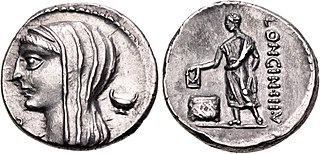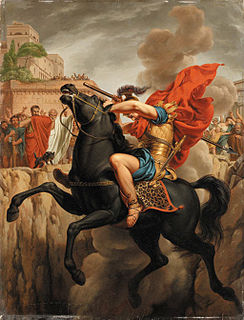Related Research Articles

Lucius Sergius Catilina, known in English as Catiline, was a Roman patrician, soldier and senator of the 1st century BC best known for the second Catilinarian conspiracy, an attempt to overthrow the Roman Republic and, in particular, the power of the aristocratic Senate. He is also known for several acquittals in court, including one for the charge of adultery with a Vestal Virgin.
Lucius Cornelius Cinna was a four-time consul of the Roman Republic, serving four consecutive terms from 87 to 84 BC, and a member of the ancient Roman Cinna family of the Cornelia gens.

The First Triumvirate (60–53 BC) was an informal alliance among three prominent politicians in the late Roman Republic: Gaius Julius Caesar, Gnaeus Pompeius Magnus and Marcus Licinius Crassus.
Gaius Memmius was a Roman orator and poet. He was Tribune of the Plebs, possibly a patron of Lucretius, and an acquaintance of Catullus and Helvius Cinna. His sister Memmia was married to Gaius Scribonius Curio.

Lucius Cornelius Sulla Felix, commonly known as Sulla, was a Roman general and statesman. He won the first large-scale civil war in Roman history, and became the first man of the republic to seize power through force.
Marcus Aemilius Scaurus was a Roman statesman who served as consul in 115 BC. He was also a long-standing princeps senatus, occupying the post from 115 until his death in late 89 or early 88 BC, and as such was widely considered one of the most prestigious and influential politicians of the late Republic.

The gens Cassia was a Roman family of great antiquity. The earliest members of this gens appearing in history may have been patrician, but all those appearing in later times were plebeians. The first of the Cassii to obtain the consulship was Spurius Cassius Vecellinus, in 502 BC. He proposed the first agrarian law, for which he was charged with aspiring to make himself king, and put to death by the patrician nobility. The Cassii were amongst the most prominent families of the later Republic, and they frequently held high office, lasting well into imperial times. Among their namesakes are the Via Cassia, the road to Arretium, and the village of Cassianum Hirpinum, originally an estate belonging to one of this family in the country of the Hirpini.

The gens Flavia was a plebeian family at ancient Rome. Its members are first mentioned during the last three centuries of the Republic. The first of the Flavii to achieve prominence was Marcus Flavius, tribune of the plebs in 327 and 323 BC; however, no Flavius attained the consulship until Gaius Flavius Fimbria in 104 BC. The gens became illustrious during the first century AD, when the family of the Flavii Sabini claimed the imperial dignity.
Gaius Flavius Fimbria was a Roman general. Born to a recently distinguished senatorial family, he became one of the most violent and bloodthirsty partisans of the consul Cornelius Cinna and his ally, Gaius Marius, in the civil war of 87 BC. During the conflict, Fimbria served them as both cavalry commander and negotiator, and took a leading part in the political purges that followed their capture of Rome, putting a number of prominent aristocrats to death.
Gaius Claudius Marcellus was a Consul of the Roman Republic in 49 BC.

Gaius Valerius Flaccus was a Roman general, politician and statesman. He was consul of the Roman Republic in 93 BC and a provincial governor in the late-90s and throughout the 80s. He is notable for his balanced stance during the Sullan civil wars, the longevity of his term as governor, and his efforts to extend citizenship to non-Romans.
Gaius Calpurnius Piso was a politician of the Roman Republic. He became praetor urbanus in 72/71 BC. After being elected consul in 67 BC, Piso opposed Pompeius' friends, the tribunes Gaius Cornelius and Aulus Gabinius. Assigned both Gallia Narbonensis and Gallia Cisalpina, he remained as proconsul until 65, or perhaps later in Cisalpina. Piso defeated an Allobrogian rebellion and repressed troubles in Transpadana, for which he was unsuccessfully prosecuted by Caesar. He supported Cicero during the Catiline conspiracy.
The gens Popillia, sometimes written Popilia, was a plebeian family at Rome. The first of the Popillii to obtain the consulship was Marcus Popillius Laenas in 359 BC, only eight years after the lex Licinia Sextia opened that magistracy to the plebeians.
Lucius Valerius Flaccus was a consul of the Roman Republic in 100 BC and princeps senatus during the civil wars of the 80s. He is noted for his peace initiatives, which failed, and for sponsoring the Lex Valeria that created the dictatorship of Sulla.
Lucius Valerius Flaccus was the suffect consul who completed the term of Gaius Marius in 86 BC. In the Roman Republic, Marius had fought a series of civil wars against Lucius Cornelius Sulla Felix, both leaders of their respective factions. Flaccus was considered a staunch supporter of Marius and Lucius Cornelius Cinna, the latter of whom shared his consulate and succeeded Marius as faction leader.
The gens Curia was a plebeian family at ancient Rome. Members of this gens are first mentioned at the beginning of the third century BC, when the family was rendered illustrious by Manius Curius Dentatus.

The gens Curtia was an ancient but minor noble family at Rome, with both patrician and plebeian branches. The only member of the gens invested with the consulship under the Republic was Gaius Curtius Philo, in 445 BC. A few Curtii held lesser magistracies during the Republic, and there were two consuls suffectus in imperial times. However, the gens is best remembered from a series of legends dating from the traditional founding of the city to the early Republic.
The gens Fannia was a plebeian family at ancient Rome, which first appears in history during the second century BC. The first member of this gens to attain the consulship was Gaius Fannius Strabo, in 161 BC.
The second Catilinarian conspiracy, also known simply as the Catiline conspiracy, was a plot, devised by the Roman senator Lucius Sergius Catilina, with the help of a group of fellow aristocrats and disaffected veterans of Lucius Cornelius Sulla, to overthrow the consulship of Marcus Tullius Cicero and Gaius Antonius Hybrida. Late in the year of 63 BC, Cicero exposed the conspiracy and forced Catilina to flee from Rome. The conspiracy was chronicled by Sallust in his work The Conspiracy of Catiline, and this work remains an authority on the matter.
The gens Magia was a plebeian family at ancient Rome. Members of this gens are first mentioned at the time of the Second Punic War. Although several of them performed useful service to the Roman state, none of the Magii ever held the consulship.
References
- ↑ Cicero (6 October 2005). Murder Trials. Penguin Books Limited. pp. 45–. ISBN 978-0-14-193608-6.
![]() This article incorporates text from a publication now in the public domain : Smith, William, ed. (1870). "Fimbria (1)". Dictionary of Greek and Roman Biography and Mythology . 2. p. 150.
This article incorporates text from a publication now in the public domain : Smith, William, ed. (1870). "Fimbria (1)". Dictionary of Greek and Roman Biography and Mythology . 2. p. 150.